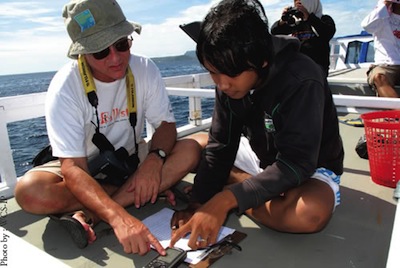Dr Brian Smith, WCS cetacean scientist, reports
In Indonesia directed fishing is the biggest threat to marine megafauna populations. To assess the degree of fishery threat to marine species in Indonesia we have started to employ fisher surveys to collect information on the type and extent of threats to megafauna in targeted locations, documenting species-specific catch rates and preferred gear types to illuminate fisheries and landings trends. The information will provide a better understanding of how these marine wildlife, primarily sharks, cetaceans, turtles, dugong and large commercial species of fish (ie. Napolean Wrasse) use the seascape and can serve as ambassadors for conservation.
Knowledge of a species abundance, distribution in time and space and use of critical habitats are key elements for their long-term protection. Yet capturing the data necessary to make informed management decisions on large highly mobile marine animals often requires a range of techniques. Local fishers are the best immediate source of information (Johannes 1998) to identify the distribution and seasonality of marine megafauna of conservation and management importance. Expansion of these surveys to collect detailed fisher knowledge on the seasonality, exact locations and relative abundance of observations of key marine wildlife species will be focussed in areas where marine protected areas exist or planned and where human wildlife conflicts are known. Using a combination of techniques to estimate population numbers and identify human interactions and patterns of use the resulting information and at areas identified by fishers will determine if the population is resident or transient and will highlight priority areas to focus on for whale shark conservation.
 Using species guides and specific questions about target fisheries, we have started to collect information on catches at markets and key shore-based landing sites, resulting in a better understanding of prices and the socioeconomic value of of these ocean giants to local fishers. We work with government agencies, fishers and local businesses in all elements of this work. Training programs for government managers and community organisations assist in incorporating stakeholder and community knowledge into existing and proposed management interventions. This kind of information helps us devise and advocate for management recommendations, including community-based tourism, and determine how to target outreach and education efforts for user groups and the general public. Information that we collect through field and interview work (both generated locally and from other sites in Indonesia) will be incorporated into community workshops, presented and disseminated to stakeholder communities and project participants as well as the larger scientific community through the WCS website, conference presentations and peer-reviewed publications.
Using species guides and specific questions about target fisheries, we have started to collect information on catches at markets and key shore-based landing sites, resulting in a better understanding of prices and the socioeconomic value of of these ocean giants to local fishers. We work with government agencies, fishers and local businesses in all elements of this work. Training programs for government managers and community organisations assist in incorporating stakeholder and community knowledge into existing and proposed management interventions. This kind of information helps us devise and advocate for management recommendations, including community-based tourism, and determine how to target outreach and education efforts for user groups and the general public. Information that we collect through field and interview work (both generated locally and from other sites in Indonesia) will be incorporated into community workshops, presented and disseminated to stakeholder communities and project participants as well as the larger scientific community through the WCS website, conference presentations and peer-reviewed publications.